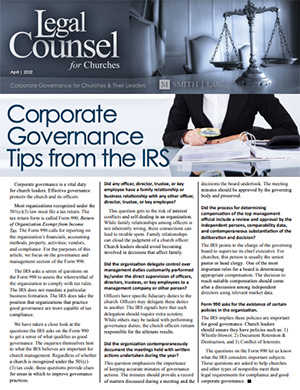A Lesson On The Duty Of Loyalty
Church board members are generally not held personally responsible for the business decisions they make on behalf of the institution. This is one of the advantages of serving a corporation or an organization that has separate legal recognition.
The protection from personal liability comes with strings attached. Directors are expected to uphold their fiduciary duties and act as any prudent corporate officer would under the circumstances. For the occasions when a church officer violates corporate law or commits an illegal act, the shield from personal liability becomes ineffective. This is when individuals can face personal liability.
Governing boards often take actions by casting voting. Regardless of whether your church is governed by a separate board, deacons, trustees, or other officials, the governing officers may reach decisions through a voting process.
If a church operates under a rule of order, such as Roberts, the voting process usually consists of someone presenting a motion, a second is made to show support, discussion ensues, and the members cast votes for or against the action.
Occasionally, a director or group of directors disagree with the proposal on the floor. In such instances, these directors may feel compelled to vote no to a motion. It is important that the directors who oppose an action vote as such and have their dissenting voices recorded in the meeting minutes.
There are good governance reasons for having an official record of dissenting votes in the meeting minutes.
Recording dissenting votes shows outside parties the church directors engaged in a healthy debate about an important issue. Church directors are bound to a fiduciary duty of loyalty to the organization. This duty mandates each director make decisions he/ she believes is good for the church. No other interests should compete for a director’s loyalties… including the opinions of fellow directors. Directors who vote nay to a motion because it is believed the decision does not serve the church’s best interests shows the kind of independence the duty of loyalty demands.
Church boards can face legal challenges for making a wrong decision. A decision must so bad that no reasonable board would have made this choice. A plaintiff would need to prove the directors violated their fiduciary duties for personal liability to attach. Directors who cast dissenting votes may protect themselves from the personal liabilities of the majority’s choice.
Dissenting directors often cause their colleagues to rethink their position on a governing question. It is helpful for directors who intend to oppose a motion to announce in advance their intention during the debate. This notice avoids surprising others when the votes are counted. Dissenting votes should be individually noted with the names of the directors who objected to the action.
Dissenting votes by directors should include for the record the reason(s) a proposal may have been resisted. It is important that churches have a clear account of how issues were addressed. For this reason, the viewpoints of dissenting directors should be included in the meeting minutes. This record is useful when such issues return someday for consideration. Church boards who understand how issues have evolved over time make better decisions for the future.
Churches should welcome dissenting voices on their governing boards. In our practice, we have seen where boards that rubber-stamp actions without robust debate miss opportunities to make better decisions. Directors should come to meetings thoroughly prepared with pre-reading materials. Board chairs should have enough situational awareness in the room to understand when directors oppose an action. Dissenting votes should be respectfully treated so all directors will feel welcome to speak up when their turn arrives.
When it becomes clear that the votes for a matter will not be unanimous, care should be taken not to rush the process. A thorough debate helps ensures the matter is exhausted. Parking lot conversations about the vote can be avoided by giving room for complete litigation during the meeting.
Church boards should listen to directors who dissent to official actions. Recording both sides of a matter is how boards improve governance.

